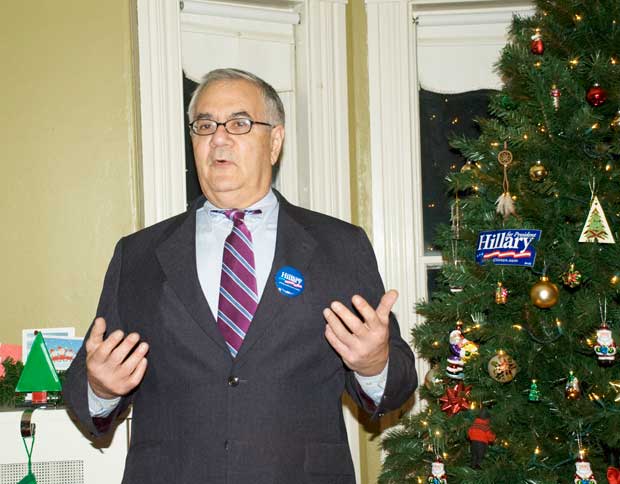Congressman made history when he came out in 1987, opening the door for other LGBT politicians
Openly gay U.S. Congressman Barney Frank’s monumental contribution to the LGBT rights movement will one day be honored in the collection of unique individuals and events that makes up every American history book.
Frank, 71 now, may not be alive to see that day arrive, but as sure as God made little apples, it’s coming.
That’s because the LGBT rights movement has become an unstoppable force under the guidance of the testy congressman from Massachusetts and that of the scores of other openly gay and lesbian politicians who have joined him over the years in public office at every level of local, state and national government.
Now that Frank, a Democrat, has announced he will retire in 2012 and not seek re-election to the congressional office he has held since 1981, it is time to start putting his contributions to the American human rights movement in perspective.
Most LGBT rights activists agree the single most important measure in achieving success requires securing a place at the table where law is being made, and Frank accomplished that at the highest level a quarter-century ago when he publicly came out.
At the time Frank came out he had already served in Congress for six years, and it surely was no surprise to his colleagues, friends and families to learn about his sexual orientation. But the same could not be said for the majority of the American public, which still viewed homosexuality as quirky at best.
Even many LGBT people were unsure in 1987 about what to make of a congressman coming out as gay and thought it would likely be the end of his political career, which he began in the Massachusetts House of Representatives in 1973.
Probably to the shock of some, Frank continued to gain respect in Congress, and he now is viewed as one of the smartest, wittiest and most eloquent politicians in Washington, D.C.
Frank achieved success and gained admiration from his peers, the media, his constituents and others — even after being enveloped in a scandal in 1989 that nearly wrecked his career. The public learned that year that Frank had an affair with a male prostitute, whom the congressman had allowed to move into his home.
Frank was investigated by the House Ethics Commission at his own request, and it ruled after a 10-month inquiry that the congressman had not been aware the live-in prostitute had continued to practice his trade from the household. The commission did recommend Frank be reprimanded for using his position as a congressman to get favors for his prostitute boyfriend.
In the height of irony, Frank survived an attempt by former Republican Idaho Congressman Larry Craig to remove him from office. Craig, who was elected in 1991 to the Senate for Idaho, made news in 2007 for attempting to solicit sex from an undercover male vice squad officer in a Minneapolis-St.Paul International Airport restroom.
Craig, who pleaded guilty to the charge but made laughable excuses about his predicament in an attempt to claim his innocence, did not run for re-election the following year. On the other hand, Frank went on after his scandal to win every following election by a wide margin.
At the time Frank came out as gay there was not much more than a handful of openly gay politicians in the nation, if that many. As Frank’s fortunes rose, so did those of other politicians in the LGBT community, and today there are openly gay and lesbian people serving in a wide variety of major elective offices.
In the last election in November, the Victory Fund saw 53 of the 75 openly gay and lesbian candidates it had endorsed elected to office, including Mayor Annise Parker of Houston, State Sen. Adam Ebbin of Virginia and State Assemblyman Tim Eustace of New Jersey.
As Frank retires from public office, he leaves behind in Congress his openly gay and lesbian colleagues Rep. Tammy Baldwin of Wisconsin, Rep. Jared Polis of Colorado and Rep. David Cicilline of Rhode Island, who also are Democrats.
No openly gay or lesbian member of Congress has ever been elected on the Republican Party ticket, although there have been a number of gay Republicans who have served from the closet. And more than one has been exposed for their hypocrisy as a result of a scandal, something Frank wisely avoided.
Frank’s legacy will be that he broke ground in American politics, inspiring other openly gay and lesbian people to seek and win elected office at every level.
That has resulted in the type of political gains that many people who have been around since the start of the gay rights movement in 1969 never thought they would see, regardless of how Frank might be viewed on some other issues.
Considering what has happened in the past four decades, it is conceivable that one day an openly gay or lesbian politician could be elected to any office, including the U.S. Senate — or even higher. That’s a thought that probably never even occurred to Frank back in 1987.
David Webb is a veteran journalist who has covered LGBT issues for the mainstream and alternative media for three decades. E-mail him at davidwaynewebb@yahoo.com.
This article appeared in the Dallas Voice print edition December 2, 2011.


















All I’ll remember Barney Frank for is how he claimed Fannie Mae and Freddie Mac were great investments during W’s administration and look at it now!